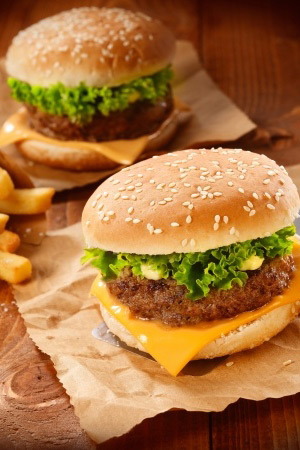 The big names in the food industry like McDonalds or Chipotle or Kraft get a lot of press when they try something new—whether it ends in success or failure— but, sometimes, the greatest innovations come from the smallest places. With fewer layers of bureaucracy that ideas need to vault past and a looser corporate structure that encourages creative thinking, small enterprises are often able to take unusual ideas to market far more quickly than larger corporations.
The big names in the food industry like McDonalds or Chipotle or Kraft get a lot of press when they try something new—whether it ends in success or failure— but, sometimes, the greatest innovations come from the smallest places. With fewer layers of bureaucracy that ideas need to vault past and a looser corporate structure that encourages creative thinking, small enterprises are often able to take unusual ideas to market far more quickly than larger corporations.
Just as a lean start-up can outmaneuver a tech giant, small food businesses can come up with startling innovations. In fact, some of the most groundbreaking new ideas in food innovation are originating in places you've never heard of.
Recognizing What Diners Want
As American tastes become more sophisticated, fast food restaurants are taking a hit to the wallet. But, there's one sector that's booming: speedy restaurants that offer diners hip settings, local produce and cruelty-free meat choices.
BurgerFi, a small burger chain based in Delray, Florida, has unlocked the secret to sustainable burger sales. The restaurant started as a small offshoot of popular Palm Beach gastropub, The Office. When the restaurant's owner discovered that most of his sales were coming from beer and their dry-aged burger, he spun the idea off into a low-key burger joint.
Launched in 2011, BurgerFi now has 45 locations, with an additional 20 expected to open this year.
Going Out on a Gustatory Limb
Frequent traveler Luke Sanders was bothered by the fact that it was easy to pick up junk food from fast food restaurants and vending machines, but quick and healthy meal choices were impossible to find. This dilemma led him to develop the Farmer's Fridge vending machine, a vending machine that sells nothing but organic, fresh, restaurant-quality salads and snacks.
Each kiosk, made of earth-friendly and attractive reclaimed wood and surrounded by live plants, is restocked at 10 a.m. every day. What isn't sold by day's end is donated to a food pantry.
To keep salads fresh all day, Farmer's Fridge uses the stacked salad technique innovated by amateurs on Pinterest: Sturdy items like chickpeas and tomatoes go on the bottom. Lettuce stays dry above it until the diner buys the salad and mixes it up. So far, sales are brisk. The vending machines have gained national attention from outlets like Entrepreneur and Fast Company. Farmer's Fridge has contracts for over 20 machines throughout the Chicagoland area.
This willingness to try new ideas is shared by biochemist Patrick Brown.
In search of a better veggie burger, Brown began considering qualities that could make a meatless burger look, feel and taste like the real thing. And he found his answer in the lab. Brown’s meatless patties, derived from root vegetables, are infused with a molecule called heme which shares the iron-colored look of hemoglobin, the substance that makes blood red. As a result, these burgers have a meaty taste very close to beef and look nearly indistinguishable from a medium-rare burger.
The idea has captured the attention of environmentally-minded investors and has raised $75 million in funding. Investors include Google Ventures and Bill Gates.
How Can Your Company Learn from the Little Guys?
While small food companies have many qualities that larger ones can't emulate, there are still many ways bigger brands can learn to be agile and adaptable like a start-up.
Give chefs, designers and marketers freedom and the budget to test new ideas, no matter how unlikely. Study your customers' behavior and offer new products based on their preferences and choices. By paying close attention and being willing to do the unusual, you, too, can achieve these small players' big wins.







